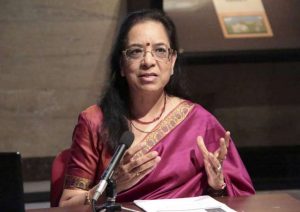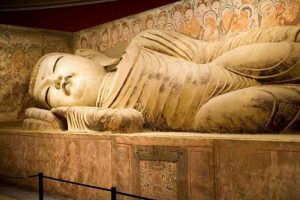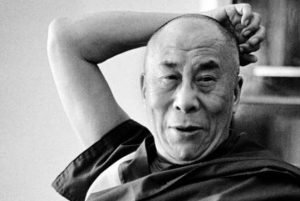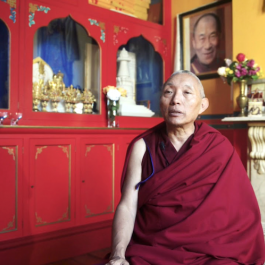
Beginner’s Mind is a special project from Buddhistdoor Global collecting insightful essays written by college students in the US who have attended experiential-learning-based courses related to Buddhism. Some of the authors identify as Buddhists, for others it is their first encounter with the Buddhadharma. All are sharing reflections and impressions on what they’ve learned, how it has impacted their lives, and how they might continue to engage with the teaching.
Christina Song wrote this essay for her Buddhist Modernism course at the University of Southern California. Christina is a senior majoring in Political Science and East Asian Languages and Cultures at USC, with an emphasis in Pre- Law. After graduation, she will attend law school in the hope of becoming a North Korean human rights lawyer.
My pre-course cetanās or intentions in selecting this Buddhist Modernism course were partly motivated by my previous delving into the teachings of Buddhism through AP World History; however, I had never encountered “socially engaged Buddhism.” I was inspired to learn and to explore how Buddhism strategically exerts power and influence and impacts the world. The types of questions that I could not answer before taking this class were how Buddhism socially impacts global crises and also on the different expressions of Buddhism. After taking this course, I now feel more confident in elaborating on the types of Buddhism: metaphysical, socially engaged, and traditional. Moreover, I am able to explain the strong and positive impact of socially engaged Buddhism on society through the path of non-violence, peace, and unity.
On a personal level, I found this course to be impactful and empowering as an Asian-American who straddles the cultures of Korea and America, and who has been witness to numerous incidents of anti-Asian hate crimes along with the circumstances surrounding the BLM movement. These racially discriminatory abuses were grim and totally unacceptable—especially during this time of global pandemic, when, more than ever, our communities need every individual to come together in support of one another.
The learning outcomes that I’ve achieved have clarified for me what it truly means to be socially engaged and ethical, as defined through the analytical lenses of professional experts. These outcomes came along most strategically and forcibly in week 10 of the Buddhist Modernism course. I had struggled in the beginning to fully grasp what it means to be a socially engaged Buddhist (SEB) activist, and the connotations behind socially engaged Buddhism. However, week 10 truly sparked my engagement with this class, giving me the ability to understand, analyze, and tackle the mindset of an SEB activist. Week 10’s discussion assignment on “War and Violence” enabled me to re-evaluate my anger toward anti-Asian hate crimes and instead place my mindset in the socially engaged Buddhist view of peace and liberation from pain, suffering, violence, and anger.
My greatest takeaway is that I now have the ability to share with future generations the importance of socially engaged Buddhism and its core values of non-violence and peace. This course has shaped me and empowered me to transform how I handle my frustrating-yet-persistent angst. Rather than evoking violence, I now understand that my anger, frustrations, and apprehensions do not necessarily lessen the crisis; to be socially empowering, I must mitigate violence with peace, silence, and calmness.
This course has affected my practices, relationships, and actions toward myself and others. Because I’ve been taking my courses in Korea since April 2020, I was frustrated and saddened that I had to leave my campus, my friends, and my professors, with whom I had become close. In fact, as a transfer student, this was essentially my first year at USC and a period of significant adjustment. Therefore, when I first returned to Korea, I underwent a long period of sorrow and misery; however, through meditation I was able to change and impact how I now deal with the global pandemic, my relationships with my friends and parents, and my school life. Through meditation, I learned to focus, to examine, and to love myself more. I think that my relationships with my friends and parents also improved immensely. I found myself able to release my daily stresses, which helped me to alleviate and control my anger, thereby improving communication with my parents and friends. Therefore, I can say that this class has transformed my life and relationships through daily meditation, bringing healing and alleviating mental and emotional stresses and burdens.
This course has also shaped my daily practices and habits; I now feel healthier and engaged in my mindfulness practice. After my daily meditation at 9am, I run for 30 minutes, and I have begun a weekly yoga program. Allowing a daily mindfulness practice has encouraged me to transform my actions, relationships, and practices. I now lead a student-based non-profit organization, established by USC undergraduate students, to provide educational and legal aid for North Korean refugees. This course has encouraged me to work toward social change and to take action for North Korean refugees in need, despite biased views against helping this community. In light of promoting social justice and human rights for North Koreans, I hope to employ the groundwork laid during this course to bring emphasis to non-violence, peace, and liberation from social injustice for the people of North Korea.
The topics that I intend to pursue beyond this class are social violence, social peace, and social unification through the analytical lens of SEB. I will continue to nurture my learning and passion for those topics because this course has taught me to witness and address social violence and attacks in a transformative way. I now wish to further research how SEB can transforms one’s mindset, one’s practice, and one’s actions toward social injustices.
Likewise, I aspire to continue developing new and different methods for future generations to apply SEB to social hate crimes, such as the Atlanta shooting incident. The shooting felt particularly close to home for me because my grandmother’s youngest sister works in the Atlanta Koreatown in Duluth. And because a South Korean single mother was murdered in the shooting, week 10’s discussion assignment on “War and Violence” compelled me to investigate the impacts of SEB on social injustice and violence.
If I could design and teach future courses, I would envision engaged Buddhism carried out by students through collaborative methods for alleviating social injustice and on-campus violence. I would further initiate a student-led organization for past and current students of this course to implement methods whereby SEB could be applied to on-campus violence and attacks to alleviate and bring healing to student victims. I believe these real-life applications would encourage students to find diverse methods to manifest SEB at USC.
The final synthesis of this class that I would like to describe is that of the Buddhist Modernism course as a dynamic think tank in which students are empowered to become pioneers, to challenge the status quo, and to improve the path ahead for the community, for society, and for the world!
References
Harvey, Peter. 2013. An Introduction to Buddhism: Teachings, History, and Practice, second edition. Cambridge: Cambridge University Press.
Related features from Buddhistdoor Global
That’s a Good Question . . .
A Reflection on Personal Goals Past, Present, and Future
Practice











